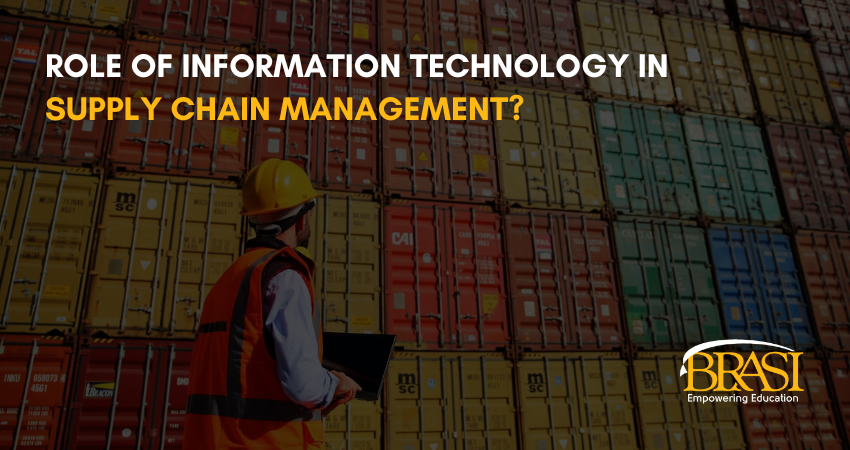IT is leaving a mark everywhere. Nothing remains untouched. No wonder every aspect of a business is now under its command! The role of IT in Supply Chain Management is highlighted in the following points.
Integrated and coordinated supply Chain
A supply chain can only work efficiently when it is properly integrated and well-coordinated. It performs this crucial task by bringing in multiple technologies and combining them to optimize the supply chain. These technologies make data collection possible and much easier and more accurate. In turn, this allows precise and detailed data analysis leading to sound business decisions.
Increased productivity
A smooth flow of information, new technologies, and effective communication increase the productivity of all entities in the supply chain. It is like a trigger for product movement. Instead of going back and forth, IT provides the link that passes the needed information continuously.
Cost reduction
IT permits the optimum utilization of resources and assets. Old data is used to study the trends, and technology is used to analyze them for improving performance. When resources are used optimally, they result in cost reduction. In a supply chain, the role of IT becomes more prominent because it motivates all parties to use their respective resources in the most cost-efficient manner. When IT is used as it should be, there is a dramatic fall in overall expenses.
Product improvement
IT consists of tools and applications which can be used to gain early awareness. In a market where consumers always want something new, the product will either have to evolve or it will go out of demand. To stay in business, you must introduce product improvement and innovation sooner rather than later. The kind and extent of product improvement can be validated with the help of IT.
Supply chain visibility
Information makes the entire supply chain visible to supply chain managers. The manner in which the information flows from one collaborator to the other and the impact it has on others is used by the managers in making strategic decisions.
Accurate information must be provided
It is very difficult to make good decisions without information that provides a complete picture of the supply chain. This is not to say all information must be 100 percent accurate, but rather that the data available paint at least a directionally accurate picture.
Timely information is required
Often, accurate information exists, but by the time it is available, it is either out of date or, if it is current, it is not in an accessible form. To make good decisions, a manager needs to have up-to-date information that is easily accessible.
Data can be used to take the right decisions
Often companies have large amounts of data that is not helpful in making a decision. Companies must think about what information should be recorded so that valuable resources are not wasted collecting meaningless data while important data goes unrecorded. Information is used for making a wide variety of decisions about each of the supply chain drivers.
Facility
The location and schedules of a facility can depend on the information on the trade-offs. Wal-Mart’s suppliers use demand information from its stores to set their production schedules. Wal-Mart uses information on cross-docking to determine where to place new stores.
Inventory
Setting optimal inventory policies requires data that includes demand patterns and costs. Wal-Mart collects detailed demand, cost, margin, and supplier information in order to make inventory policy decisions.
Transportation
To make good decisions one needs to know transportation networks, routings, modes, shipments, and vendors. Wal-Mart’s use of information to integrate its operations with those of its suppliers is important. Wal-Mart will be able to avoid inter-chain transportation by using cross-docking in its transportation network.
Sourcing
Information on profit margins, prices, quality, delivery lead times, etc., is important in making sourcing decisions. The source deal with inter-enterprise transactions and demands a wide range of transactional information.
Pricing and revenue management
The more information one needs, the more information it is necessary to set pricing policies. With this information, firms can make intelligent pricing decisions to improve supply chain profitability.
Related: The Functional Roles of IT in Supply Chain Management
You Should Also Read:
How Does Information Technology Affect Supply Chain Management?
Logistics 4.0 and Smart Supply Chain Management
How to Move to Intelligent Supply Chain Management

Danish Mairaj is a medical device expert with a strong focus on regulatory and quality compliance. He has been involved in managing clinical trial infrastructure including supplies and logistics. He has over 15 years of experience in the MedTech and Pharmaceutical industry. He is a certified Product Owner, Scrum Master, and Project Management Professional PMP. He studied Biomedical Engineering in Germany and MedTech Regulatory & Quality in Galway, Ireland. He contributes articles to the BRASI newsletter.
-
Danish Mairaj#molongui-disabled-link




